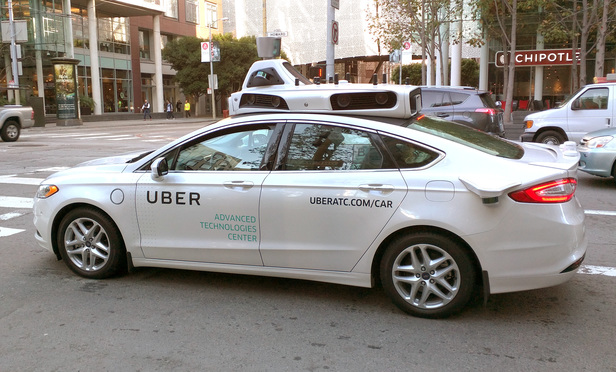SAN FRANCISCO — A federal judge has blocked Uber Technologies Inc. from using information contained in 14,000 files allegedly misappropriated from Google Inc. by a former engineer at Waymo, Google’s driverless car division.
In a 26-page ruling unsealed Monday morning, U.S. District Judge William Alsup also ordered Uber to remove the engineer, Anthony Levandowski, from any role in developing LiDAR technology, the laser technology that helps self-driving cars “see” their surroundings, and to prohibit him from consulting on that technology with other Uber employees. Alsup instructed Uber to return the pilfered files to Waymo by May 31 and to provide a detailed accounting of every person who was exposed to their contents.
Alsup, who has referred the case to the U.S. attorney’s office for investigation of possible trade secrets theft, framed his order as a narrowly-tailored injunction. The judge said Uber knew or should have known that Levandowski downloaded the files when it recruited him to head up its self-driving car development “but neverthess proceeded to bring Levandowski … on board.
“It would strain credulity to imagine that Levandowski plundered Waymo’s vault the way he did with no intent to make use of the downloaded trove,” the judge added.
Alsup denied a request for an order that would block Uber from infringing two Google patents, concluding that the technology at issue is not being used by Uber in its current projects.
Just what Alsup’s ruling will mean for Uber’s driverless car unit is difficult to say on first pass, but it stands as an early victory for Google and its lawyers at Quinn Emanuel Urquhart & Sullivan.
“Competition should be fueled by innovation in the labs and on the roads, not through unlawful actions,” a Waymo spokeperson said in an emailed statement. “We welcome the order to prohibit Uber’s use of stolen documents containing trade secrets developed by Waymo through years of research, and to formally bar Mr. Levandowski from working on the technology.”
Uber is represented by Morrison & Foerster and Boies Schiller Flexner.
“We are pleased with the court’s ruling that Uber can continue building and utilizing all of its self-driving technology, including our innovation around LiDAR,” Uber said in a statement. “We look forward to moving toward trial and continuing to demonstrate that our technology has been built independently from the ground up.”
Alsup issued the injunction ruling on Thursday under seal to give both sides an opportunity to propose redactions. Also on Thursday, Alsup rejected Uber’s motion to compel arbitration of the dispute.
The judge said Google presented evidence that some information contained the 14,000 files has seeped into Uber’s driverless car development. But Alsup also criticized Google’s legal team for overreaching in the case and trying to declare broad engineering concepts and principles to be Google-owned trade secrets.
During a May 3 hearing on Google’s motion for a preliminary injunction, Alsup held two separate sealed sessions to dig into the details of the alleged “trade secrets” underlying the case. Uber had argued that Google was claiming exclusive rights to well-established concepts in LiDAR, a laser-based scanning and mapping technology used to help a car “see” the world around it. But Alsup found that Google had proved at least some of its claimed trade secrets were protectable.
Waymo sued Uber in February accusing it of using LiDAR technology stolen from Google by a former manager Anthony Levandowski. The complaint claimed that Levandowski downloaded 14,000 confidential Google computer files before he left to start his own rival company last year, which was later purchased by Uber.
So far in the litigation, Levandowski has invoked the Fifth Amendment and refused to answer questions about what he might have taken from Waymo. Prior to the May 3 injunction hearing, Uber’s lawyers told Alsup that Levandowski had been recused “from all LiDAR development” and that Uber would “not oppose an order to that effect pending trial.” The voluntary sequestration wasn’t enough for Alsup.
“Levandowski remains in possession of over 14,000 confidential files from Waymo, at least some of which likely contain Waymo’s trade secrets,” the judge wrote. “Misuse of that treasure trove remains an ever-present danger wholly at his whim.”
This article will be updated.
Ben Hancock is a San Francisco-based reporter for The Recorder and Law.com. He writes about the future of litigation, including third-party finance, legal data analytics, and artificial intelligence in the law. Contact Ben at [email protected]. On Twitter: @benghancock





